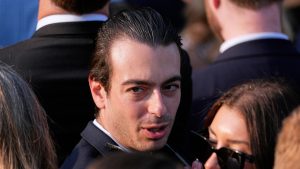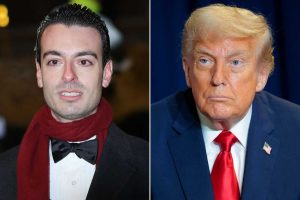Washington D.C. – Paul Ingrassia, US President Donald Trump‘s nominee to head the Office of Special Counsel, announced on Tuesday that he was withdrawing his nomination after reports of racist messages sent by him surfaced earlier this week. The Ingrassia nomination withdrawal came following massive backlash and pushback from Republicans as well as Democrats after deeply offensive text messages became public.
The controversial texts included statements such as “Never trust an Indian” and suggestions that the Martin Luther King Jr. holiday should be “tossed into the seventh circle of hell.” These inflammatory remarks sparked immediate condemnation and effectively doomed the Ingrassia nomination withdrawal before Senate hearings could even commence.
Republican Opposition Seals Fate of Nomination

Reports indicated that Ingrassia had shared a series of racist text messages in a group that included other Republicans. After the news surfaced and Ingrassia started receiving widespread backlash, many Republican senators publicly stated that they would not support his nomination, making the Ingrassia nomination withdrawal inevitable given the bipartisan opposition to his confirmation.
The swift Republican desertion of the nominee demonstrated that certain boundaries remain in place even in highly partisan times. When members of the President’s own party refuse to support a nominee, the Ingrassia nomination withdrawal becomes a political necessity rather than a voluntary choice.
Official Statement on Ingrassia Nomination Withdrawal

In explaining the Ingrassia nomination withdrawal, he stated that he was removing his name from consideration because “unfortunately I do not have enough Republican votes at this time.” This frank admission acknowledged the political reality that his confirmation had become impossible following the revelation of his offensive communications.
In a social media post announcing the Ingrassia nomination withdrawal, he also wrote that he would continue serving Trump and his administration despite this setback. “I will be withdrawing myself from Thursday’s HSGAC hearing to lead the Office of Special Counsel because unfortunately I do not have enough Republican votes at this time,” he wrote, referring to the Senate Committee on Homeland Security and Governmental Affairs.
Continued Loyalty Despite Ingrassia Nomination Withdrawal
Despite the circumstances surrounding the Ingrassia nomination withdrawal, the former nominee expressed continued dedication to the Trump administration. “I appreciate the overwhelming support that I have received throughout the process and will continue to serve President Trump and the administration to Make America Great Again!” he added in his statement.
This assertion of loyalty following the Ingrassia nomination withdrawal suggests he may seek other positions within the administration that do not require Senate confirmation, allowing him to remain part of Trump’s political orbit despite this public controversy.
Deeply Offensive Text Messages Revealed
The text messages that precipitated the Ingrassia nomination withdrawal contained multiple inflammatory and racist statements that shocked observers across the political spectrum. According to texts reviewed by investigators, Ingrassia told group members that “MLK Jr. was the 1960s George Floyd and his ‘holiday’ should be ended and tossed into the seventh circle of hell where it belongs.”
These remarks about the revered civil rights leader and the federal holiday honoring him represented only part of the offensive content that led to the Ingrassia nomination withdrawal. The messages revealed a pattern of racially charged commentary that extended beyond a single incident or misstatement.
Targeting Multiple Ethnic Groups
The texts that forced the Ingrassia nomination withdrawal also contained derogatory remarks about multiple ethnic communities. Ingrassia stated in the text chain that you can “never trust a Chinaman or Indian,” using an outdated and offensive term for Chinese people while also disparaging Indian individuals.
Additionally, Ingrassia claimed in these communications that he had “a Nazi streak” from time to time, a shocking admission that further contributed to the collapse of support for his nomination. These multiple offensive statements across different contexts made the Ingrassia nomination withdrawal unavoidable.
Also Read: Trump Diwali Celebration: Powerful Modi Praise and Oil Trade Claims
Legal Defense Questions Text Authenticity
Following the revelation of the messages that prompted the Ingrassia nomination withdrawal, his lawyer Edward Paltzik questioned the authenticity of the text messages and suggested they could be AI-generated. This defense strategy attempted to cast doubt on whether Ingrassia actually wrote the offensive remarks attributed to him.
However, Paltzik’s defense went further, stating that if the texts are authentic, they were meant as “self-deprecating and satirical humour.” This explanation strained credibility given the explicitly offensive nature of the statements and failed to prevent the Ingrassia nomination withdrawal from proceeding.
“Satirical Humour” Defense Falls Flat
The attempt to characterize the racist statements as “satirical humour” did nothing to stop the Ingrassia nomination withdrawal, as few observers found this explanation convincing. The defense suggested that calling Martin Luther King Jr. “the 1960s George Floyd” and advocating for elimination of the MLK holiday constituted some form of humor, an argument that persuaded virtually no one.
Similarly, the characterization of “never trust an Indian” as self-deprecating satire made little sense, particularly given that Ingrassia is not of Indian descent. These weak explanations accelerated rather than prevented the Ingrassia nomination withdrawal.
Bipartisan Rejection of Offensive Rhetoric
The Ingrassia nomination withdrawal ultimately reflected bipartisan consensus that certain forms of racist rhetoric remain disqualifying for high federal office, even in an era of intense political polarization. When Republican senators joined Democrats in refusing to support the nomination, they sent a message that some standards persist.
Implications for Future Trump Nominees


The rapid Ingrassia nomination withdrawal following exposure of racist texts may influence the vetting process for future Trump administration nominees. The incident demonstrates that even in a politically charged environment, nominees with documented histories of offensive communications face insurmountable obstacles to confirmation, making thorough background investigations essential before nominations are publicly announced.
The Ingrassia nomination withdrawal serves as a reminder that Senate confirmation processes, despite their partisan nature, still maintain certain minimal standards for federal appointees, particularly regarding explicit expressions of racial prejudice and religious intolerance.

